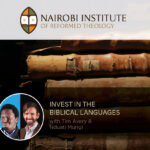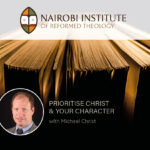Excellent Reformed and Evangelical conferences are held across Africa every year. The TGC Africa Podcast showcases select conferences to encourage and build up the local church across our continent.
This talk is the first of 2 delivered at the 2024 Gauteng REACH Women Conference hosted at Christ Church Midrand, South Africa.
What’s the best invitation you have ever received? What made it so good? Psalm 100 is one of those; and it’s also much more. In Psalm 100 God the Creator calls everyone to come before him. The great king and God invites his creation to worship him. It is a summons, an invitation not only to sing songs of praise to God but offer up ourselves to him. But why should we praise him?
In a world where everything runs out, God’s love doesn’t.
As Psalm 100:5 reminds us: “the Lord is good; his steadfast love endures forever, and his faithfulness to all generations.” One of the many reasons to praise and worship God is that he is faithful. Lindi says, “In a world where everything runs out, God’s love doesn’t. His faithfulness towards his children remains the same.”
We often draw a distinction between praising God and giving thanks, between worship and gratitude. But Psalm 100 brings those together; for in it the psalmist gives thanks to God that he is praiseworthy. His goodness and love, together with his many other attributes, are reasons for both thankfulness and awe, gratitude and worship. As Lindi says, “This is an invitation we should respond to every day. Joyful shouts of praise should always be on our lips. Gratitude should be the default setting of our heart and soul.”
Psalm 100 is a call to come face to face with our Lord, praising him with all of our hearts and enjoying him in all of life.
Other Content On This Topic
How Do I Cultivate Joy as a Christian?
Psalm 67: Let All Peoples Praise Our God
Make the Call to Worship Great Again
Exodus 15: A Praise Song That Will Never End
Date: Saturday, 03 August 2024
Location: Gauteng REACH Women Convention, Christ Church Midrand, Johannesburg, South Africa
Transcript
Bible Reading
Our reading today is taken from Psalm 100. You will find it in your brochures.
Make a joyful noise to the Lord, all the earth!
Serve the Lord with gladness!
Come into his presence with singing!
Know that the Lord, he is God!
It is he who made us, and we are his;
we are his people, and the sheep of his pasture.
Enter his gates with thanksgiving,
and his courts with praise!
Give thanks to him; bless his name!
For the Lord is good;
his steadfast love endures forever,
and his faithfulness to all generations. (Psalm 100)
This is the word of God.
Gratitude Not Guilt
I just want to say good morning, ladies. It’s so lovely to see you and to be here with you this morning. I’m really honoured. Yeah!
If you’ve ever dealt with kids, you know that those little humans can really put you through the ringer, right? Whether you are an aunt or you’re a grandma or you’re a guardian, a babysitter or a mom, there are times when dealing with kids, where you find yourself thinking, “What did I get myself into?!” Those moments where those little humans will really make you question the whole of your life and the decisions that you’ve made.
So, a couple of years back, I was going through one of those phases. My son, Esihle was 9 and I felt like I was really, totally bombing as a parent. And, to be honest, I think I’d felt like that since day one, since the day they put him in my arms. So, it just felt like I had been praying to be a better parent since, like, forever but things were really rough for a couple of months there, when he was 9.
I remember I was really just not enjoying this whole parenting gig at all and I remember just praying and I kept asking God, “Would you just help me please enjoy my son?” I kept asking him, “Would you help me to actually have fun hanging out with him, so that it just doesn’t feel like a chore.”
Around the same time, I was training for this Sprint Triathlon for my 40th birthday. The training was a real slough. It was long, it was hard and sometimes it was just mind-numbingly boring. So, to keep myself from growing crazy, I came up with this idea that I was going to spend my time as I was training just going through a list of people that are in my life and thanking God for each of them.
So, as I did that, guess what? I actually started enjoying the training because I started looking forward to the mornings where I would be going through the list of people and just remembering them and remembering memories with them, memories that were a blessing to me and being able to thank God for them. So, some people were in the list every day. Some people came up as I was going through the list.
So, I remember that as I was going through these prayers and I was thanking God for the people in my life, the more I thank God for them, the more I started appreciating them.
So, there I was one day in the morning as usual and I’m running and it was time for Essie to be part of my gratitude list. So, I started thanking God for him as usual, as I had been doing those mornings when suddenly it hit me like a ton of breaks; that I had actually really been enjoying my time with him. I remember that it shocked me so much – the realization – that I stopped in my tracks. I stood there sweaty, out of breath, thinking, “Whoa, when did that happen?”
And I found myself actually at that moment asking the Lord, “Lord, when did you sneak in and answer that prayer?” And right there, as I was asking that question, a mind-blowing answer came to mind. Now, I know that it was God because, let’s face it, I’m just not that clever to come up with such an answer! So here was the answer. The answer was this: “Baby, you live out of gratitude, not out of guilt.”
So, it hit me at that moment that this whole time I’d been operating from a place of guilt. My prayers were just dripping with guilt. But somewhere along the lines, as I was doing my list of thanking God for the people in my life and thanking God for Essie, the guilt had melted away without me even noticing. And in its place, joy had come.
That year it finally clicked that being grateful isn’t just some cheesy advice. Gratefulness is like a secret source for actually enjoying life. Well ladies, I’m glad you’re here this morning and you can join as we reflect on this very important topic of gratitude and thankfulness.
Study of Psalm 100
Now just to orientate us; this morning is divided into two sessions and as it’s already been said, so for the first session, we’re going to be looking at what thankfulness looks like from Psalm 100. And then in the following session, we’re going to dig deeper into how we can actually apply gratitude in our daily lives.
So please don’t run away. We’re going to look at Psalm 100 and then in the next session, we’re going to apply how we can apply gratitude in our own lives. So again, if you would open with me to Psalm 100. Before we read, let me pray for us.
Father, we thank you for your word. We thank you that it’s lifegiving. We thank you this morning that you speak through it. So, we pray, Father, that you would speak to our hearts, Lord, as we look at the topic of gratitude, may your Spirit transform us and make us ever so grateful for your mercies toward us and your unfailing love and faithfulness that endures forever, amen.
Psalm 100, this is how it reads, I’ll read it for us again.
A psalm for giving grateful praise.
Shout for joy to the Lord, all the earth.
Worship the Lord with gladness;
come before him with joyful songs.
Know that the Lord is God.
It is he who made us, and we are his;
we are his people, the sheep of his pasture.
Enter his gates with thanksgiving
and his courts with praise;
give thanks to him and praise his name.
For the Lord is good and his love endures forever;
his faithfulness continues through all generations. (Psalm 100:1-5)
A Special Psalm for Thanksgiving
Although Psalm 100 is a short Psalm, it is quite a special Psalm. And I have two reasons why this Psalm is special. Firstly, it is one of the few Psalms in the Bible that tells us, in line one, what the Psalm is about. So, as you read Psalm 100, you don’t have to really work hard to find out what the point of the Psalm is. The answer is given right there in line one: “A Psalm for giving grateful praise,” or in some Bibles, “A Psalm for thanksgiving.”
Now in our English Bibles, this is written in small letters as a note on top of the Psalm, but here’s the thing; in the Jewish Hebrew Bible, that note is actually part of verse one. So, the Jews would have read that line “A Psalm for giving grateful praise,” as part of the Bible. So, in the Jewish Scripture this isn’t just an introductory note to the Psalm, but rather it is a declaration that sets the tone for everything that follows.
You see, when we read Psalm 100 and we read that line, we are invited to see every word through the lenses of gratitude. Think of it as putting glasses that helps us to understand how each verse, each word teaches us about being thankful. So, from the first, “Shout for Joy to the Lord” to the call to “enter his gates with Thanksgiving,” every line of this Psalm is about recognizing God’s goodness and expressing our thanks.
Firstly, it’s special because we know what it’s about.
Secondly, it’s a special because in Jewish tradition, this Psalm of gratitude is a Psalm that God’s people would recite every day. And it is recited every day so that God’s people will remember of God’s goodness and that they would start the day in thankfulness and joy.
Now there are only two days which this Psalm is not recited in the Jewish tradition. The first is on Shabbat which is the Sabbath and the second day would be the day called “Yom Kippur” which would be the Day of Atonement.
Now these were special days. One was a day where God’s people came to sacrifice for their sins. And the Sabbath is obviously a special day that God had said they must set apart. So, Psalm 100 is recited every day except for these two days.
And the interesting thing about that is that in some ways, the fact that this Psalm is not recited on the two special days, but recited on every other day, makes the point that gratitude is not reserved for only special occasions. Gratitude is something that should be practiced every single day.
So, in our daily prayers, Psalm 100 is like a constant reminder to be thankful. It’s a call to start each day recognizing God’s goodness and celebrating his presence.
Invitations To Worship
Now the Psalm is structured in two, around two invitations that come with reason for the invitation. It’s right up there. Okay so the first invitation is in verse 1 and 2. And the invitation is the invitation to, “Shout for joy to worship the Lord with gladness,” (Psalm 100:1) and to, “Come before him with joyful song.” (Psalm 100:2) And the reason for this invitation is found in verse 3: “Know that the Lord is God. It is he who made us, and we are his; we are his people, the sheep of his pasture.” (Psalm 100:3)
And then in verse 4, we get the second invitation, “Enter his gates with thanksgiving and his courts with praise. Give thanks to him and praise His name.” (Psalm 100:4) And the reason for this invitation is found in verse 5, “For the Lord is good and his love endures forever; his faithfulness continues through all generations.” (Psalm 100:5)
So, this is the structure of the Psalm. So then, this morning, we’re going to be looking at these invitations and these reasons. Now the first invitation has three calls in it: “Shout for joy, worship the Lord with gladness; come before him with joyful song.” So, let’s look at the first call, a call to shout for joy.
A Call to Shout for Joy
Now I don’t know if you are familiar with “imbongi.” If you’ve lived in South Africa long enough, I suspect you would have seen “imbongi,” most likely on TV at some point. Now “imbongi” is a Xhosa praise poet or a praise singer. In the Xhosa culture, the “imbongi” would perform ceremonial activities at important events.
The Xhosa “imbongi” is often a member of a royal entourage and on significant public occasions, “imbongi” will recite poetry in praises of the chief, referring to the chief’s lineage, his qualities and his actions. “Imbongi” is often a member of the welcoming party when there is a royal visit and he is said to be the poet who walks before the great Chief.
Now if you’re old enough, you might remember some of these moments that we’re going to see up on the screen. (Halala Mandela – Zolani Mkiva)
Now that is “imbongi,” so he’s the one who shouts praises to the great Chief. And that guy there is the one who was shouting praises for our late former president, Tata Madiba, when he was inaugurated. So that’s “imbongi.” His job is to shout praises when there’s a special event.
So, “Shout to the Lord all the earth,” declares the Psalmist. So here we are seeing a call to shout to the Lord. Shout for joy, but not to a chief or the King of AmaXhosa or the king of the Zulu Nation. Shout for joy, but not to the Queen of England. Shout for joy, but not to some great Chief or even a president.
Shout for joy to the Lord all the Earth, all you nations, shout to the Lord.
Now the word “ruah” which is the word that’s translated into “shouts for joy” in Hebrew carries a sense with it of expressing a glad shout, a loud shout where God’s people would shout for joy when the king appears among them. Now this would have been probably a shout after a king had been at war and he’d been victorious and he comes back and he enters his kingdom and the people would roar in shouts, in praises, to Him.
So, in our Psalm, when the psalmist, the psalmist is like “imbongi” of the people of God and he’s calling, he’s inviting and he’s commanding the whole earth to join him in praising the Lord, as loudly as they possibly can, because they are happy with him. Shout to the Lord all the earth.
Now I want us to notice the boldness of the Psalmist. There’s a boldness in this invitation that we might miss. The Psalmist is calling all the nations and he’s calling them so openly and so loudly to join him in shouting to the Lord. You see, the reason this is a bold invitation is because the nations would have had their own Gods that they worshiped. And yet, the Psalmist, our “imbongi” is adamant and he makes no excuses. He insists that it is the Lord, Yahweh, it is him that all the people of the earth must acclaim.
Notice how the Lord is cantered in this song of gratitude? “Shout for Joy to the Lord, all the earth. Worship the Lord with gladness. Come before him with joyful song.” You see, the focus of our shouting for joy, for our worshiping with gladness, for our coming with joyful song is the Lord himself. It is to him that we must raise our voices with shouts of joy. So, there’s a call to shout for joy.
A Call to Serve with Gladness
The second call is the call to serve with gladness. “Worship the Lord with gladness,” (Psalm 100:2) declares the Psalmist. Now I don’t know if you’ve noticed this but, in some translations, the translations use the word “serve” instead of worship. And this is not a mistake. It’s because the Hebrew word for worship and for serve, the Hebrew word “avad” is the same word. So, when the Psalmist says “Worship the Lord,” he is saying serve the Lord. So, we are to serve the Lord with gladness.
Now on the screen there I have a letter. This is an old, official government correspondence letter from the UK and it has a stamp which is the crown, yeah, it’s right there. But what I want us to notice about this letter is that line that’s written, “On Her Majesty’s service.”
And the reason for this line, I’m told, I’m not from the UK, is because in the UK, the government is considered to be Her Majesty’s government, at least it was before she passed on. It is now His Majesty Charles’ government. So those who work in the government are then considered to be in the service of her majesty, or now his majesty’s government.
And that’s exactly, really what the Psalm is calling us to this morning. The psalmist is calling us to worship to serve his majesty – not Her Majesty the Queen – but His Majesty the Lord and the king of all the Earth. So, he’s calling you and he’s calling me to be in the service of His Majesty.
But notice this cannot be any old type of serving. No, this is not the kind of serving that does as little as possible or the bare minimum, that you might find at Home Affairs. No, the service that the Psalmist is calling us to is the service that can only be rendered gladly, wholeheartedly and with happy hearts.
And that’s why he repeats this idea 3 times, in verse 1 and 2. If you notice, he says there, “Come with joy, gladness, joyfully.” The king is to be served with gladness. So, we called to shout for joy and we called to serve him with gladness and the next call is to come before him.
A Call to Come Before God
Now we’re invited into his presence. Again, the word translated “before him” is the Hebrew word “paneh” and it’s the same word that is used for face. So, when the Psalmist is calling us to come before him, he’s actually calling us, inviting us, to come face to face with God.
Now in 2004 in Joburg, we might miss how extraordinary a privilege this is, but the people of Israel would have not. It was an extraordinary call to be called to come face to face with their God. They would have been mind blown with this invitation, because, you see, this is an invitation of intimacy. You’re coming face to face with the king of the universe.
I don’t know about me. I don’t like people close up in my face. So, my son likes to be close up in my face and half the time I’m like, “Get off my face!” But here, the king of the universe is saying, “Come face to face with me.”
And how are we to come face to face with him? Well, Psalm 100 tells us that it is with joyful songs. So, it’s not with whining, it’s not with grumbling, but with joyful songs. We are to come and approach the throne, like “imbongi” with joyful songs, praising our Lord.
Now in verse 3, we’re given the reasons why we are to come. So why are we called to shout for joy? Why are we called to serve with gladness? Why are we called to come before him, before his face? Well, look at verse 3 again. The reasons are because the Lord is God, because he made us, because he shepherded us.
Earlier, we said that the Psalmist centres the Lord in this song. Now here, another thing he does is he just doesn’t just centre the Lord, he centres the name of the Lord. And again, we can easily miss this in our English Bibles because of how we use Lord and God interchangeably, but the more literal reading would say: “Know that Yahweh, he is Elohim.”
What the Psalmist is doing is that he’s using the personal name of the Lord. He uses a sacred name, a name that represents God’s character and his essence. He’s saying, “Know that Yahweh is God, he is the one true God. This is not just any other God, this is Yahweh; the Great I Am, the God of Abraham, Isaac and Jacob, the covenant God, the one who chose a people for himself so that through them, he can bless the whole earth.”
And that’s why, in verse 3, he says he deserves praise and thanksgiving. You see, there’s a boldness in this declaration of faith. Verse 3 says, know this, get this, recognize this, admit this, confess this – all you people of the earth – that Yahweh, he is the one true God.
And why should he be recognized as the one true God? Well, the next verse says “because he made us.” We did not make ourselves. And secondly, he did not just make us, he shepherds us, he leads us, he guides us, he takes care of us.
So why should we shout for joy? Why should we serve with gladness? and why should we come before his face with joyful songs? Because Yahweh is the one true God, who made us and shepherds us. These are the reasons to be thankful.
An Invitation to Enter His Courts
And verse 4 and 5 represents the second movement, the second invitation, and it’s very similar to the first invitation. It’s arranged in the same manner; we’re invited and we’re given the reason for the invitation. Look at it:
Enter his gates with thanksgiving
and his courts with praise;
give thanks to him and praise his name.
For the Lord is good and his love endures forever;
his faithfulness continues through all generations. (Psalm 100:4-5)
So, let’s just briefly double click on these 3 things that the Psalmist does here. So, we are invited to enter, we are told how we must enter, and we are told why we should enter. So, let’s go over them.
Enter his gates and his courts. The invite is to enter his gates and his courts. And again, just like in verse 1 and 2, notice that it is his gates that we invited to enter, it is his courts that we must enter. We’re not being called to enter other gates and other courts, it’s Yahweh’s court and Yahweh’s gate that the Psalmist is calling us to enter.
I like how Psalm 84:10 puts it,
“Better is one day in your courts
than a thousand elsewhere;
I would rather be a doorkeeper in the house of my God
than dwell in the tents of the wicked.” (Psalm 84:10)
So, when the Psalmist in Psalm 100 invites us to enter, he knows this. He knows that it’s better to be in his courts.
Now in the Old Testament, the gates and the courts formed part of the Temple’s outer areas. It was a sacred space and entering was a huge privilege because it gave you access to the royal courts of the king. And that’s an amazing thing, isn’t it? The invite is open to all to enter. All you nations, you are invited to enter.
But how are we to enter? How do we enter his gates and his courts? The Psalmist says “with thanksgiving and praise.” When I first read this, I used to understand it as you enter, basically, thanksgiving and praise is like a key to enter. But I’ve since understood that that’s not what the psalmist is saying here. You already have been invited to enter; so, praise and thanksgiving is not a key to enter, rather it’s what you bring as you enter.
So, what the verse is saying is that when you enter, bring thanksgiving and praise with you.
You see, in the Old Testament when God’s people entered the temple, they would have brought sacrifices to the Lord. They would have brought animals to the temple, that’s how they would have entered the gate. But the Psalmist is saying here, you enter with thanksgiving and praise.
It says there, “Through him, then, (this is in Hebrews) through him then, let us continually offer up a sacrifice of praise to God, that is the fruit of lips that acknowledge his name.” (Hebrews 13:5)
That’s what the writer of Hebrew says. So instead of animals, the Psalmist says bring gratitude and praise to the courts of God. So, when we enter, we bring thanksgiving and praise. And while we’re there, what do we do? We praise his name; we bless his name.
We are then given the reason why we should enter, so if you haven’t really been convinced yet that you should enter, there’s another reason here that’s given why you should enter, okay. And the reasons are because the Lord is good, his love endures forever, his faithfulness continues through all generations.
So, we are given three compelling reasons to enter. The first one: the Lord is good. Yahweh is good and he has been nothing but good to his people, the Psalmist is declaring.
Now, unlike the unpredictable gods of the time, unlike the unpredictable Baal of the Canaanites who needed to be appeased with human sacrifice, Yahweh is good. And unlike the cruel evil Molech, who demanded the lives of innocent children as sacrifice, Yahweh is good. And unlike the powerful Egyptian gods like Rah, who for all the so-called power couldn’t care less what happens to the people and the welfare of the subjects, Yahweh is good. So, the invite to enter his gates is because God is good.
Secondly, the invite to enter is because God’s love endures forever. In other words, it is steadfast and eternal. See, God’s love – there is absolutely nothing human about his love – God love, God’s love is not uncertain, as our love can be. It’s not so conditional, as our love can be. It is not based on a give and take, as our love can be. It is it cannot be deterred, it cannot be shaken, cannot be broken. Enter his gates, why? Because God is love.
And the third reason to enter his gates is because God is faithful and his faithfulness continues through all generations. See, the Psalmist here is declaring that God is faithful and his faithfulness never runs out. His mercy, his love, his compassion, his kindness, his goodness, his grace towards me and you never run out.
You know there’s a song that we sing at my church – Hope – that says, “Your love never fails, never gives up, it never runs out on me.” It’s a comfort to know this, isn’t it? In a world where everything runs out, God’s love doesn’t. His faithfulness towards his children remains the same. And as the prophet said of him, ‘His mercies never come to an end” and “They are new every morning.” (Lamentations 3:22-23)
What We Learn
So, as we close this Psalm, I’m going to just ask us to think just a few things that we learn in this Psalm, and we’re going to deeply apply these things in the next session. But for now, I just want you to ponder on this: what does the Psalm teach us? It teaches us to be thankful when we worship. The Psalmist teaches us to say thank you. Thank you, God, for being a good God, for being a loving God, for being a faithful God, for your love that never runs out.
Again, the Psalm teaches us to show joy. So, the Psalm teaches us that gratitude is shown in our shouts of singing and happiness before God. And then I say; remember who God is. The Psalm also teaches us to be grateful because God made us. He takes care of us; he shepherds us and he’s the one true God.
Another thing we see in the Psalm is that gratitude is for everyone. It is for me, it is for you, it is for everyone. None of us are excluded from this call to be grateful and to come before God with thanksgiving. We also see that God is good and we should be thankful for his goodness towards us.
So, as I close this first session, we are reminded to say thank you. Thank you, God, for what you’ve done. Thank you for who you are. Let me pray for us.
Father, we thank you that you are a faithful God. We thank you for this invite to come to you, to praise you, and to give you thanks. And Lord, as we sit and go into this break, Lord, we just pray that, Lord, that your word will be sinking in our hearts. And Father, as we come back for the next session and we see how these things work themselves out in our lives, Lord would you transform us? Would you change us? Father, would we hear you and would we hear your heart.
We pray this morning Lord that you would open our eyes to see your beauty so that thankfulness and gratitude will naturally flow. Father, we pray that you would help us not to be blinded by the things that go on and forget to be thankful to you. So, we ask this in Jesus’ name, amen.
Lindiwe Banda serves as the operations director at Hope Church, Auckland Park, Johannesburg. With a background in theological education, she previously lectured at Johannesburg Bible College and led the young adult and the internship ministry at Hope Church. Lindi is married to Simon, and together they are blessed with a child, Esihle.














